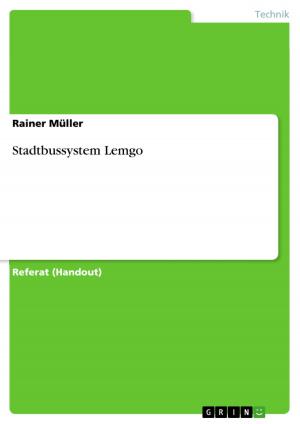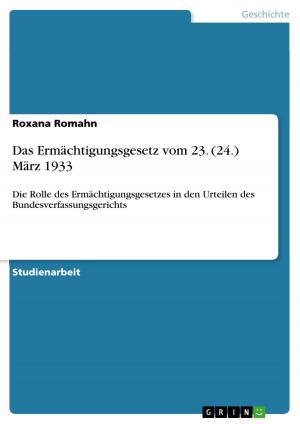Joe Christmas: A Critical Analysis of William Faulkner's Protagonist in Light in August
Fiction & Literature, Literary Theory & Criticism, British| Author: | Nancy Hadlich | ISBN: | 9783638024907 |
| Publisher: | GRIN Verlag | Publication: | March 18, 2008 |
| Imprint: | GRIN Verlag | Language: | English |
| Author: | Nancy Hadlich |
| ISBN: | 9783638024907 |
| Publisher: | GRIN Verlag |
| Publication: | March 18, 2008 |
| Imprint: | GRIN Verlag |
| Language: | English |
Seminar paper from the year 2003 in the subject English Language and Literature Studies - Literature, grade: 1,3, Johannes Gutenberg University Mainz (FASK Germersheim), course: Seminar, 8 entries in the bibliography, language: English, abstract: 1.Introduction '...Here I am I am tired I am tired of running of having to carry my life like it was a basket of eggs...'(Light in August 255) These are the words of Joe Christmas at the age of thirty-six. They signify tiredness and resignation. Christmas is one of the main characters and a central figure in William Faulkner's Light in August (LIA). What causes this state of fatigue? What makes Joe Christmas give up? This paper deals with several factors that become the trigger for Joe's obvious resignation. Faulkner created a character who mainly suffers from elements like the race issue, womankind, self-destruction and society. These factors belong to a stirring complex of themes which can hardly be separated. Nevertheless, I will work on them separately in this paper in order to illustrate their connections. In Joe's case these factors are not only strongly connected, they even cause each other. All his experiences, his behavior and his environment mold Christmas into an outcast from society and push him into isolation. He becomes a kind of third-rate human being who is not able to leave the vicious circle that captures him until he is killed by Percy Grimm. Christmas embodies a constant struggle for identity which already starts in his early childhood. At the orphanage dark people call him white. On the other hand, white human beings look down on him as a nigger. This period will be dealt with in the following chapter. It introduces most of the topics belonging to Christmas' fate.
Seminar paper from the year 2003 in the subject English Language and Literature Studies - Literature, grade: 1,3, Johannes Gutenberg University Mainz (FASK Germersheim), course: Seminar, 8 entries in the bibliography, language: English, abstract: 1.Introduction '...Here I am I am tired I am tired of running of having to carry my life like it was a basket of eggs...'(Light in August 255) These are the words of Joe Christmas at the age of thirty-six. They signify tiredness and resignation. Christmas is one of the main characters and a central figure in William Faulkner's Light in August (LIA). What causes this state of fatigue? What makes Joe Christmas give up? This paper deals with several factors that become the trigger for Joe's obvious resignation. Faulkner created a character who mainly suffers from elements like the race issue, womankind, self-destruction and society. These factors belong to a stirring complex of themes which can hardly be separated. Nevertheless, I will work on them separately in this paper in order to illustrate their connections. In Joe's case these factors are not only strongly connected, they even cause each other. All his experiences, his behavior and his environment mold Christmas into an outcast from society and push him into isolation. He becomes a kind of third-rate human being who is not able to leave the vicious circle that captures him until he is killed by Percy Grimm. Christmas embodies a constant struggle for identity which already starts in his early childhood. At the orphanage dark people call him white. On the other hand, white human beings look down on him as a nigger. This period will be dealt with in the following chapter. It introduces most of the topics belonging to Christmas' fate.















